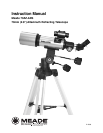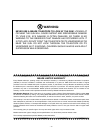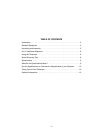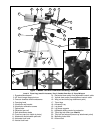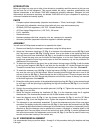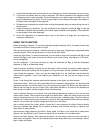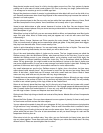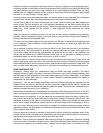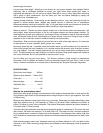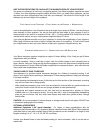
– 10 –
USE THE SPECIFICATIONS TO CALCULATE THE MAGNIFICATION OF YOUR EYEPIECE
The power of a telescope is how much it magnifies objects. Your 26mm eyepiece magnifies an object
13 times. Your 9mm eyepiece magnifies objects 36 times. But if you obtain other eyepieces, you can
calculate how much magnification they have with your telescope. Just divide the focal length of the
telescope by the focal length of the eyepiece.
F
OCAL LENGTH OF THE TELESCOPE ÷FOCAL LENGTH OF THE EYEPIECE = MAGNIFICATION
Look at the specifications. You will see that the focal length of your scope is 350mm. Let’s say that you
have obtained a 13mm eyepiece. You can tell that what the focal length of your eyepiece is as it is
always printed on the side of an eyepiece. Divide: 350 ÷ 13, which equals 26.9. Round this off to the
nearest whole number and your new eyepiece magnifies objects 27 times.
If you use your Barlow lens with one of your eyepieces, it doubles the magnification of your eyepiece.
Other types of Barlows can triple or further increase the power of an eyepiece. To find out how much
your magnification is when you use a Barlow, multiply your eyepiece’s magnification by two.
E
YEPIECE’S MAGNIFICATION X 2 = MAGNIFICATION WITH A 2X BARLOW LENS
Your 26mm low-power eyepiece magnifies an object 13 times. Multiply 13 by 2 and you get 26 times
magnification with your Barlow.
It’s worth repeating: Keep in mind that a bright, clear, but smaller image is more interesting than a
larger, dimmer, fuzzy one. Using too high a power eyepiece is one of the most common mistakes made
by new astronomers. So don’t think that higher magnification is necessarily better—quite often the best
view is with lower magnification value!
TAKING CARE OF YOUR TELESCOPE
Your telescope is a precision optical instrument designed for a lifetime of rewarding viewing. It will
rarely, if ever, require factory servicing or maintenance. Follow these guidelines to keep your telescope
in the best condition:
• Avoid cleaning the telescope’s lenses. A little dust on the front surface of the telescope’s correcting
lens will not cause loss of image quality.
• When absolutely necessary, dust on the front lens should be removed with very gentle strokes of a
camel hair brush or blown off with an ear syringe (available at most pharmacies).
• Fingerprints and organic materials on the front lens may be removed with a solution of 3 parts
distilled water to 1 part isopropyl alcohol. You may also add 1 drop of biodegradable dishwashing
soap per pint of solution. Use soft, white facial tissues and make short, gentle strokes. Change
tissues often.
CAUTION: Do not use scented or lotioned tissues or damage could result to the optics. DO NOT use
a commercial photographic lens cleaner.
OPTIONAL ACCESSORIES
Additional Eyepieces (1.25" barrel diameter): For higher or lower magnifications with the
telescopes that accommodate 1.25" eyepieces, Meade 4-element Series 4000 Super Plössl eyepieces
yield wide fields of view with excellent edge-of-field corrections and are available in a range of focal
lengths including 6.4, 9.7, 12.4, 15, 20, 26, 32, and 40mm.
Contact your Meade Dealer or see the Meade catalog for more information. Visit us on the web at:
meade.com.



